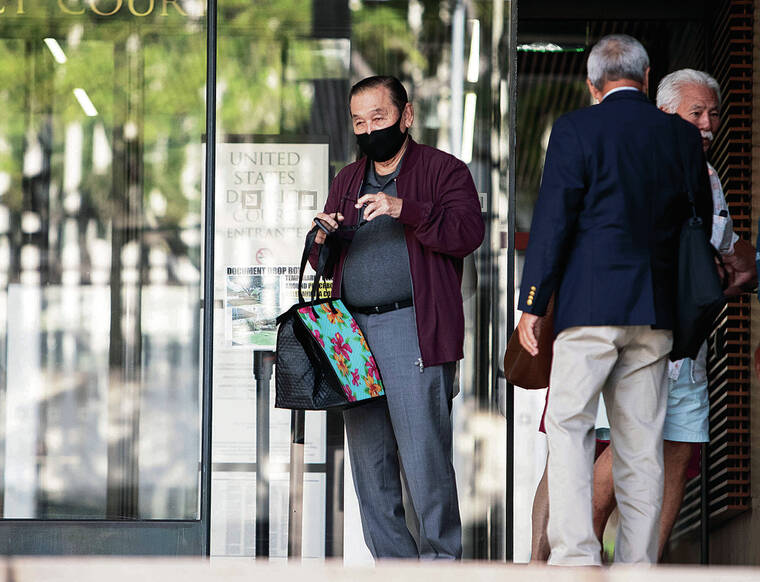HONOLULU — A federal magistrate judge ordered prominent Hawai‘i businessman and political donor Dennis Mitsunaga to remain jailed for the duration of his public corruption trial because of alleged witness tampering.
Mitsunaga, 82, was arrested by agents with the Federal Bureau of Investigation on Friday and spent the weekend in jail. Mitsunaga had been free on an unsecured appearance bond of $50,000.
U.S. Magistrate Judge Nathanael M. Cousins revoked his bail and Monday ordered that he remain at the Federal Detention Center, Honolulu, after members of the defense team allegedly leaked grand jury testimony, according to federal court documents.
One of Mitsunaga’s employees also allegedly tried to convince one of Mitsunaga’s friends, a former Honolulu police officer, to change his story at trial.
Cousins wrote in his order issued Monday that federal prosecutors established by “more than clear and convincing evidence” that Mitsunaga violated the pretrial release condition that he have “no contact, directly or indirectly,” with a specified witness.
Assistant U.S. Attorney Michael Wheat and his team from San Diego “established probable cause” that Mitsunaga obstructed justice and tampered with a witness.
Cousins rejected attempts by Mitsunaga’s defense team to toughen his release requirements and “found these enhanced restrictions to be insufficient.”
“Mitsunaga’s recent actions show cunning, audacity, planning, and desperation. He is unlikely to abide by any combination of conditions of release,” wrote Cousins on Monday.
Mitsunaga, the founder of local engineering and architectural firm Mitsunaga & Associates Inc., is on trial for allegedly bribing former city Prosecutor Keith Kaneshiro with campaign contributions in exchange for prosecuting a former MAI employee.
Kaneshiro is also on trial in the corruption case.
The U.S. Department of Justice “learned of multiple violations of the Protective Order, including wrongful dissemination of Grand Jury material to a third party and a witness in this case,” according to the documents.
“Of significant concern to the truth-seeking function in this trial, in one instance described below, grand jury material — an underlined grand jury transcript — was delivered to an upcoming witness by an MAI employee during a meeting designed to convince the witness to change his testimony at trial,” according to an emergency motion for enforcement of the protective order filed April 14 by Assistant U.S. Attorney Colin M. McDonald.
McDonald wrote that the prosecution spoke to defense attorneys and reminded them of the protective order, especially as it pertained to grand jury transcripts. The government believed that was addressed without the need for court intervention.
“However, on April 6, 2024, the United States again learned that Grand Jury material had been disseminated by the defense to another witness, Rudy Alivado,” wrote McDonald.
After the trial started, an employee from MAI asked to meet with Alivado. During that meeting, the MAI employee gave Alivado a copy of his grand jury testimony from July 2021.
“Alivado’s grand jury transcript had been underlined in places to draw his attention to specific aspects of his prior testimony. Ultimately, the purpose of the meeting was to confront Alivado with his grand jury testimony and persuade him to change what he previously said before the grand jury when called as a witness in this case,” wrote McDonald.
“Indeed, Alivado believed this was precisely the purpose of that meeting; there was no other interpretation of what had transpired.”
Mitsunaga’s attorney, Nina Marino, objected to the government’s assertions.
She noted in a heavily redacted filing Sunday about why his bail should not be revoked that Mitsunaga has known Alivado since high school, has several business interests with him, “and they are friends.”
“In nearly two years, Mr. Mitsunaga has not had a single violation until now, Marino wrote. “On October 24, 2022 the conditions of release were modified to include a no contact order from 28 people, many of whom Mr. Mitsunaga had known for decades. One of those people was Rudy Alivado.”
Marino tried to get Mitsunaga house arrest, with a court-approved guardian paid for by Mitsunaga, noting his poor health, advanced age and decades of community service.
Marino suggested that Mitsunaga and his wife use “real property with equity of approximately $1.2 million that can be utilized to secure the bond.”
The house arrest with electronic monitoring Marino suggested would limit Mitsunaga’s movements “to his home, meetings with his attorneys, court and necessary medical appointments.”
The no contact order would be toughened and “further limited to only his attorneys, his wife, his daughter and grandchildren,” Marino wrote. Mitsunaga also would not be able to call anyone but his attorneys, wife and daughter.
Cousins rejected the suggested terms.
He conducted a “review of U.S. Pretrial Services’ Report, other documents on file, and arguments of counsel,” and revoked Mitsunaga’s bail for the remainder of the trial.
Mitsunaga will be kept “separate, to the extent practicable, from persons awaiting or serving sentences or being held in custody pending appeal” at the Federal Detention Center, Honolulu, Cousins wrote.
Defense attorneys moved to exclude evidence of Mitsunaga’s witness tampering saying it would be “inflammatory” and create unfair prejudice toward them, according to a response by McDonald filed Monday.
The motion to exclude evidence of Mitsunaga’s alleged tampering was not available Monday on the Public Access To Court Electronic Records website.
“Dennis Mitsunaga’s attempt to alter or silence upcoming witness testimony is powerful evidence proving the existence of the underlying conspiracy and Mitsunaga’s consciousness of guilt of that conspiracy,” wrote McDonald.





